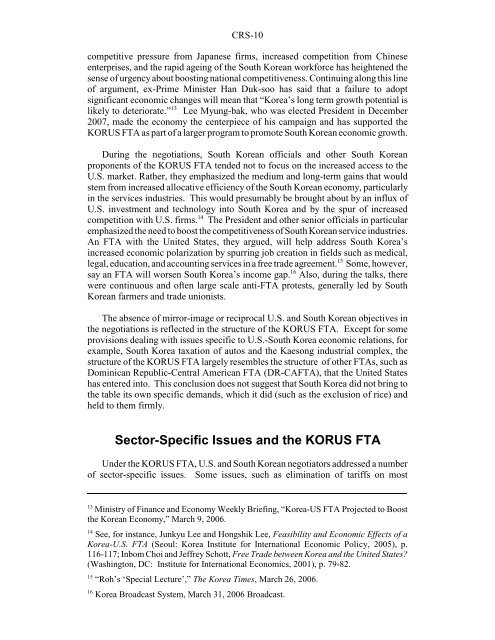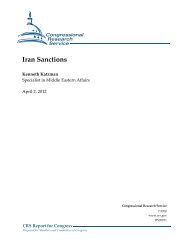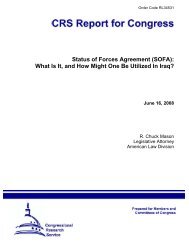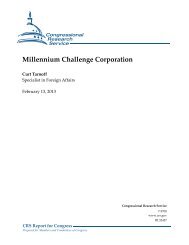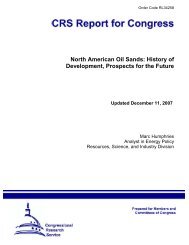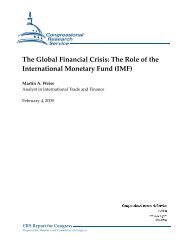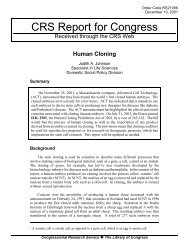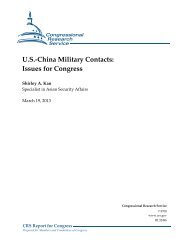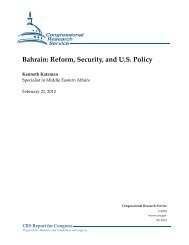The Proposed U.S.-South Korea Free Trade Agreement (KORUS ...
The Proposed U.S.-South Korea Free Trade Agreement (KORUS ...
The Proposed U.S.-South Korea Free Trade Agreement (KORUS ...
- TAGS
- korea
- fpc.state.gov
You also want an ePaper? Increase the reach of your titles
YUMPU automatically turns print PDFs into web optimized ePapers that Google loves.
CRS-10<br />
competitive pressure from Japanese firms, increased competition from Chinese<br />
enterprises, and the rapid ageing of the <strong>South</strong> <strong>Korea</strong>n workforce has heightened the<br />
sense of urgency about boosting national competitiveness. Continuing along this line<br />
of argument, ex-Prime Minister Han Duk-soo has said that a failure to adopt<br />
significant economic changes will mean that “<strong>Korea</strong>’s long term growth potential is<br />
likely to deteriorate.” 13 Lee Myung-bak, who was elected President in December<br />
2007, made the economy the centerpiece of his campaign and has supported the<br />
<strong>KORUS</strong> FTA as part of a larger program to promote <strong>South</strong> <strong>Korea</strong>n economic growth.<br />
During the negotiations, <strong>South</strong> <strong>Korea</strong>n officials and other <strong>South</strong> <strong>Korea</strong>n<br />
proponents of the <strong>KORUS</strong> FTA tended not to focus on the increased access to the<br />
U.S. market. Rather, they emphasized the medium and long-term gains that would<br />
stem from increased allocative efficiency of the <strong>South</strong> <strong>Korea</strong>n economy, particularly<br />
in the services industries. This would presumably be brought about by an influx of<br />
U.S. investment and technology into <strong>South</strong> <strong>Korea</strong> and by the spur of increased<br />
competition with U.S. firms. 14 <strong>The</strong> President and other senior officials in particular<br />
emphasized the need to boost the competitiveness of <strong>South</strong> <strong>Korea</strong>n service industries.<br />
An FTA with the United States, they argued, will help address <strong>South</strong> <strong>Korea</strong>’s<br />
increased economic polarization by spurring job creation in fields such as medical,<br />
legal, education, and accounting services in a free trade agreement. 15 Some, however,<br />
say an FTA will worsen <strong>South</strong> <strong>Korea</strong>’s income gap. 16 Also, during the talks, there<br />
were continuous and often large scale anti-FTA protests, generally led by <strong>South</strong><br />
<strong>Korea</strong>n farmers and trade unionists.<br />
<strong>The</strong> absence of mirror-image or reciprocal U.S. and <strong>South</strong> <strong>Korea</strong>n objectives in<br />
the negotiations is reflected in the structure of the <strong>KORUS</strong> FTA. Except for some<br />
provisions dealing with issues specific to U.S.-<strong>South</strong> <strong>Korea</strong> economic relations, for<br />
example, <strong>South</strong> <strong>Korea</strong> taxation of autos and the Kaesong industrial complex, the<br />
structure of the <strong>KORUS</strong> FTA largely resembles the structure of other FTAs, such as<br />
Dominican Republic-Central American FTA (DR-CAFTA), that the United States<br />
has entered into. This conclusion does not suggest that <strong>South</strong> <strong>Korea</strong> did not bring to<br />
the table its own specific demands, which it did (such as the exclusion of rice) and<br />
held to them firmly.<br />
Sector-Specific Issues and the <strong>KORUS</strong> FTA<br />
Under the <strong>KORUS</strong> FTA, U.S. and <strong>South</strong> <strong>Korea</strong>n negotiators addressed a number<br />
of sector-specific issues. Some issues, such as elimination of tariffs on most<br />
13 Ministry of Finance and Economy Weekly Briefing, “<strong>Korea</strong>-US FTA Projected to Boost<br />
the <strong>Korea</strong>n Economy,” March 9, 2006.<br />
14 See, for instance, Junkyu Lee and Hongshik Lee, Feasibility and Economic Effects of a<br />
<strong>Korea</strong>-U.S. FTA (Seoul: <strong>Korea</strong> Institute for International Economic Policy, 2005), p.<br />
116-117; Inbom Choi and Jeffrey Schott, <strong>Free</strong> <strong>Trade</strong> between <strong>Korea</strong> and the United States?<br />
(Washington, DC: Institute for International Economics, 2001), p. 79-82.<br />
15 “Roh’s ‘Special Lecture’,” <strong>The</strong> <strong>Korea</strong> Times, March 26, 2006.<br />
16 <strong>Korea</strong> Broadcast System, March 31, 2006 Broadcast.


